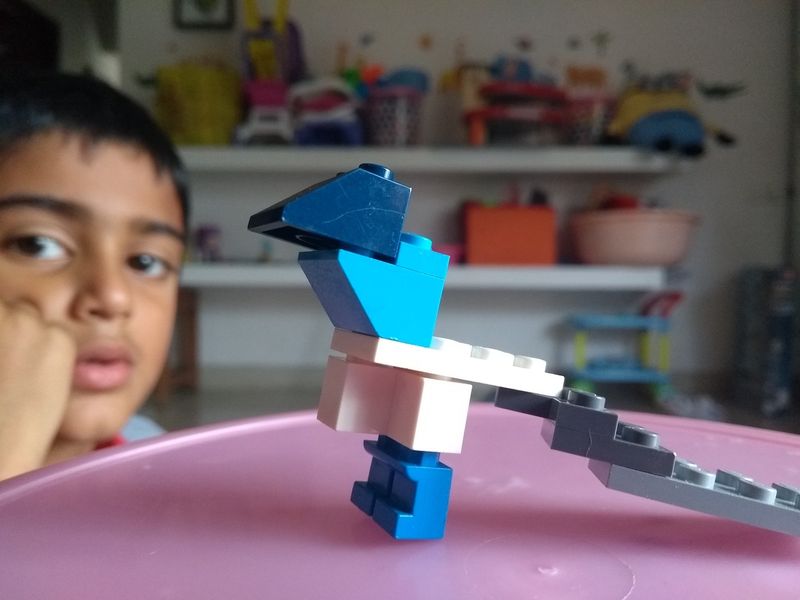Stop spoon feeding! 3 ingredients to inspire deep learning in 6 year olds to 60 year olds
Published by Aditya Jhunjhunwala,
Why do we resist learning? Why do some people learn faster that others? A large part of the answer lies in the learning environment they have access to. Human beings are not wired to learn for the sake of learning. Human beings are wired to solve. That is why they say “necessity is the mother of invention". We are natural born solution seekers. If you want to help someone learn deep and fast, here are three things to try.
1 - Challenges motivate more than rewards
Morning is when I have the duty of getting my son Dhyaan ready and off to school. Sometimes, we have a few minutes before we need to head down to the bus stop. To keep him busy, I said “let's do Lego!" I didn’t need to say it a second time.
Then, I threw him a challenge.
“Can you make a Lego Dinosaur with only 6 pieces?", I asked.
He looked at me. “Thats not possible, Papa".
“Not possible, or difficult?"
“Difficult. Very difficult" came the reply.
I left the room to fill his water bottle. When I returned, he had constructed his own Philosoraptor using 9 lego blocks. He made it, as he likes to say “from my imagination", i.e. his own design without referring to any manuals! He used not six, but nine pieces. But, that’s ok. I saw delight on his face!
2 - Constraints spark creativity more than abundance
A few years ago, we were facilitating a workshop called “Learning to learn" with 56 managers at an electronics company. We grouped them in teams and challenged them to each make their own short film. None of them had ever held a video camera before, forget about script writing and film editing. But we challenged them. To top it, we asked them to make the entire film on ZERO budget. They stared at us in disbelief, or maybe even sympathy, thinking we have gone off our rockers.
But, after six weeks of efforts and a little bit of encouragement, they had done it. All the teams managed without spending a single rupee. The approached friends and family for help. They even walked up to strangers and asked them to be actors for an hour. They found freely available software to help them edit and publish their videos. They found videos on youtube to learn how to do storyboarding, lighting, sound engineering and editing.
Those people shattered some mental barriers that slow down learning. The films went viral within and outside their company.
The zero budget, the limitation of having to use only 6 pieces made the challenges more interesting. It made them come alive with new ways of thinking. It made them search for solutions which otherwise the mind would not have considered.
3 - Reflection is more helpful than actually helping!
“Papa, can you help. I can’t do this!" said my 7 years son.
“I don’t know how to using editing software. I can’t do this!" said the managers at the workshop.
“Ohhh… what shall we do?" I followed up with “What do you think might work?" and “Who can we ask for help". I empathised with their struggle, but gave them no answers. Obviously, I had the solution to their problem. But then it would have been my solution, not theirs. All I did was listen, listen and listen more. Every now and then I added a “Do you want to try asking so and so?" or “Would it help to try and…"
They did find the answers and get the job done. They just needed someone to be there as a soft cushion when they hit a hard wall. They needed someone to help them not give up. A few reflective questions helped them to refresh their perspective. That’s all.
My 7 year old took the challenge. Managers with 30 years of experience took the challenge. They struggled, but they found answers.
Human beings are wired to solve.
We need an education system that challenges us. And then it lets us be. We need mentors who don’t push us or keep asking us for updates. They support when support is really needed. And crucially, they know when to let us struggle and when to hold our hand.
Give them a real problem. Throw them a friendly challenge. Let there be some constraints. And then, back-off! Allow them to make some mistakes. Don’t spoon-feed them with solutions! Just hang around to watch the fun and throw in some reflective questions. You will see deep learning right happening right before your eyes. There is little warning though, there may be some chaos and it will need tremendous patience on your part! But, it will be worth it.

